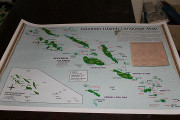
Solomon Islands (MNN) — Twelve years ago, a near civil war on the Solomon Islands forced Wycliffe Bible Translators teams to leave the chain of large, volcanic isles. Fearing Scripture would never be translated into the seventy Solomon Islands languages, inhabitants had to start their own translation efforts. Now, as the number of people working on translation steadily increases, Wycliffe helps islanders develop translation teaching programs.
In 1998, intense fighting broke out between ethnic groups on Guadalcanal, the largest island, forcing nearly 20,000 residents to leave their homes and killing almost 100 people. Militia from the rival ethnic group staged a coup in June 2000, forcing the prime minister to resign. At this time, Wycliffe and its partners were working on Bible translation under the name Solomon Islands Translation Advisory Group (SITAG).
Rising violence caused Wycliffe staff to leave the country for safety. Translation efforts halted, and as the violence continued, Solomon Islanders weren't sure if they would ever have Scripture in their heart languages. Local leaders who had been working with SITAG realized the need for a self-sustaining organization. From civil turmoil rose the Solomon Islands Bible Translation and Literacy Partnership (SIBTLP), an organization of Solomon Islanders working on Bible translation and literacy.
The number of Solomon Islanders who want to be involved in translation efforts is steadily increasing. Wycliffe's Debbie Conwell coordinates training and review for SIBTLP, and helps to plan and execute two-week training programs. These programs teach Solomon Islanders how to translate Scripture. Because the need for training has increased so rapidly, SIBTLP now considers having fourteen workshops a year instead of two.
Ask God to keep sustaining this ministry. Click here to support Wycliffe's projects in the Pacific.
